Radiologists From Ukraine Share Their Stories
Struggles and successes as radiologists overcome extraordinary challenges to save lives
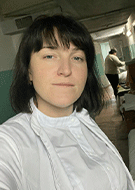
Kachanova
This is one of a series of stories for RSNA News provided by radiologists working in Ukraine. The story is posted as written and the opinions of the authors are their own.
Greetings, dear colleagues! I would like to tell you a short story about the vision of the war in Ukraine through my eyes.
I am a military radiologist, head of the computed tomography department in a military hospital located in the city of Irpin. This is the Irpin of the Kyiv region that the whole world knows about these days, as well as other nearby cities...Bucha (mutilated, raped bodies of even small children), Gostomel (where the largest airplane in the world, the MRIA, was destroyed), Borodyanka, Vorzel and many others. These are destroyed cities, and with them the lives of innocent people were destroyed, tortured.
The team of my department is small, before the war it consisted of two doctors and two X-ray technicians. We got a CT scanner only in 2018 and in the near future we planned to launch an MRI machine. As the war started in 2014, of course, we needed new diagnostic methods to better treat and rehabilitate our defenders.
In addition to being a doctor, I am also a mother of two children and an officer's wife. Finally, after waiting for my vacation, which is very difficult to plan when there are two military men in the family, we went to Lviv with our children and everything seemed to be going very well until I was called up early for service and not just me... all of us, by a separate order of the highest command, and that was already worrying.
I was already at my workplace on February 16, 2022, everything was calm, we worked as usual. A few days later we received an order to check and refill our emergency bags once again, but we did it without any reservations, as we are military personnel and this is provided for by our statute and governing documents.
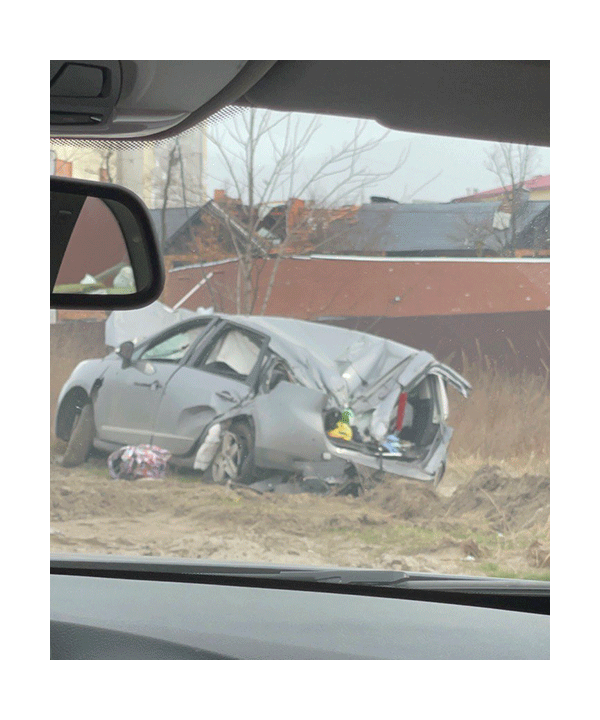
The evening of Wednesday, February 23, seemed almost normal to me, except that everyone was advised on television to pack their emergency bags in advance, to ask where the nearest bomb shelter was, and so on. I also started packing our suitcase and planned to finish it sometime in the next few days. Maybe my brain didn't consider it an extremely important signal at the time. In the morning, everything had to be according to plan: school, kindergarten, work.
And then at 4:30 a.m. on February 24, 2022, the life of every Ukrainian turned upside down. Initially, I was woken up by my husband talking on the phone at about 5 a.m., and then I heard these terrible words from him—IT HAS BEGUN. I asked: "What has begun?" He said, "War, full-scale war."
And then I could hear the whole 10-story building waking up at once: children screaming, doors slamming, cars running in the yard. We had somehow packed our emergency suitcases and heard extremely loud explosions, one after another. They were rockets, and already on the street the children saw the flames from the flying rockets and the smoke columns, as there was a strategic object near our block. These explosions were heard all over Ukraine, in almost every region.
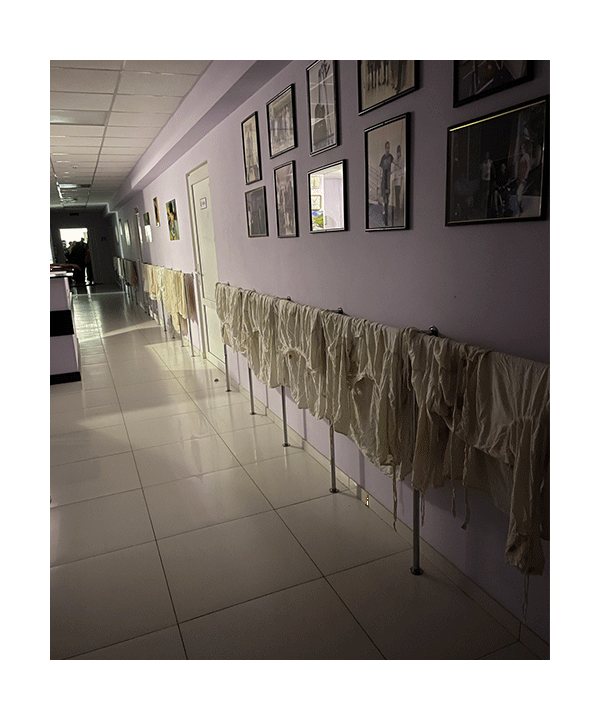
And then I began to realize that I had to be at my workplace in Irpin, my husband had to be in his unit, and we were leaving the children with grandparents who would not be able to go anywhere with them on their own, and at that moment I became very scared that I might never see any of them again. And then I catch myself thinking that I didn't plan this, it shouldn't have happened, it's some kind of a terrible dream, I wanted to wake up and everything would be fine.
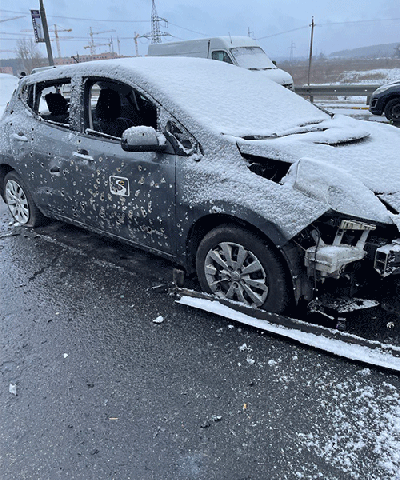
Approximately at 10 a.m., somehow avoiding traffic jams, I was able to drive onto the road that led me directly to Irpin, and I saw columns of military vehicles moving in parallel with me, and closer to Gostomel, fighter jets and helicopters began to fly overhead, landing enemy troops at the Gostomel airport.
Realizing that we were going to stay at our workplaces for an indefinite period of time, we immediately began to equip the basement, camouflage the windows, and set up a new work schedule.
Most of the people in our department were women, and very quickly we began to realize that we were here, but our children were not with us, and we could not take them to a safe place and had no permission to leave the territory of the unit. And like every adequate person with an instinct for self-preservation, I wanted to leave everything behind and run to rescue myself, my children, my family, but then when I realize that someone else's children, husbands, young boys and girls are also fighting behind the fence. They are also scared, but they do not leave their positions, they blow up bridges with themselves, for a free Ukraine, for our bright future-and then you calmly exhale the air from your chest and accept a new reality where you stay in your place and do not rush anywhere.
Gradually, one comes to an understanding that this is a real war in which people are dying, and that you are not immune to it either.
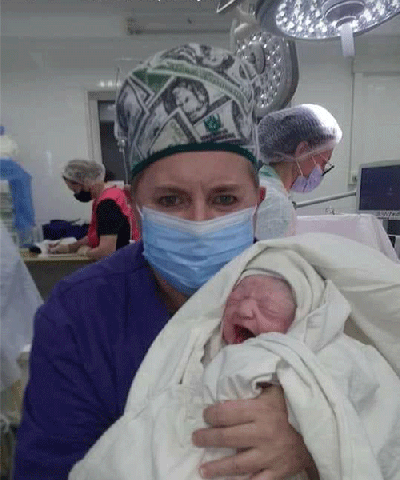
There were explosions around us all the time, both during the days and at nights, and if you went up to the upper floors of the building, you could see the columns of black smoke around you. Every day these explosions were getting closer, and the smoke was getting bigger, the number of injured people was constantly growing. There were both servicemen and civilians who tried to leave the occupied territory on their own. It became horrible when we started to receive children.
The injuries were of various types, including open craniocerebral trauma, amputated extremities, injured faces and thoracic-abdominal wounds with internal bleeding. The peculiarity of the soldiers was that they received bullet penetrating wounds through parts of the body not covered by body armor and helmet, for example, through the upper aperture of the chest, hot metal fragments up to 15-20 mm penetrated into the mediastinum and stuck to the wall of the main vessels or myocardium, which could only be removed in a specialized center.
In my mind, the greatest respect deserves the steel endurance of our surgeons and anesthesiologists, who heroically performed their duty even when the walls of their building were constantly shaking from the explosions and, of course, they could not go down to the basement and you can't just take a patient down there. Although we had such attempts, but the condition of the patient deteriorated dramatically.
However, there were also pleasant moments. A pregnant young girl was brought to us on the 5th day, who could not evacuate in time, and it was decided to perform a cesarean section before the start of labor, as we do not have obstetricians on staff. And to everyone's delight, a healthy full-term baby girl was born, and both mother and child were doing well.
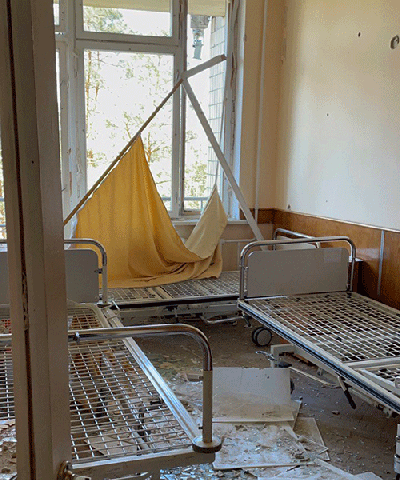
And then mines, shells and rockets started flying into our territory and some buildings, and there were power and water cut-offs. It became dangerous to move around the territory.
At 7:30, I think on March 4, an enemy fighter jet dropped a bomb on a residential building with people in it. The force of the explosion was so great that we all fell to the floor, some windows and glass doors shattered, and in about 10 minutes, as I thought at the time, an ambulance brought us a man with a broken spine and a torn spinal cord for a CT scan. He could no longer feel his limbs. Others were taken to the emergency room. Some died under the rubble. The last patient we took for a CT scan was a woman of about 45. She and her husband were trying to get out of the occupied territory, but came under fire. The man was killed immediately, and a massive metal fragment hit her in the cheekbone area, causing a large hematoma on her face, but did not damage any critical structures. I was surprised that she could not even cry. She did not fully realize what had happened and that she was now a widow.
Later, due to permanent shelling, we lost electricity, water and the Internet. Then almost immediately, the coverage of all mobile networks was lost, and we couldn't even tell our families that we were still alive.
The intensive care unit and the operating room switched to the generator. We had only one, unfortunately, it was enough fuel only for several days, and we could not get it anywhere, as at that time all the roads were under bombardment and bridges were blown up. Of course, no one even tried to run the CT scanner, X-ray machines and most of the laboratory analyzers using the generator, as the resource was limited, the autoclaves stopped working, surgical suits were washed by hand and sterilized surgical material was running out.
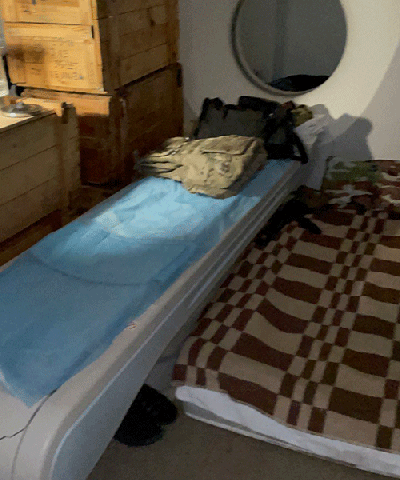
The question of the necessity of our further location became very critical, as the enemy was getting closer. We heard rumors that our government was constantly trying to organize green corridors to evacuate civilians in all areas of active hostilities, but it was impossible to reach an agreement with the invaders and most people were in basements without electricity and had no information at all.
Realizing that the evacuation remained risky, but having no other solution, on March 7, almost all patients of our hospital were successfully evacuated, primarily those in serious condition. The next day, the rest of the wounded and we had the opportunity to do so.
Now for me, March 8 is like another birthday, because I survived. You know, actually getting into the car that was supposed to take us to the Romanivsky Bridge was very scary, because most people didn't make it along this route, so each of us realized that the chance of getting there alive was not that great. Those 10 minutes were like an eternity for me, but it was enough to realize how much I just wanted to live, to hear my children laugh, to see their smiles, to be with my family. When we were dropped off on the bridge, we saw many abandoned, shot up cars, including those with the words "CHILDREN", a long line of frightened people under the bridge, children and elderly people in wheelchairs, bicycles, baby carriages, toys abandoned on the side of the road. Small buses stopped on the opposite side of the river and people boarded them very quickly, as this place remained quite dangerous, the shelling could start at any moment.
Until the beginning of April, our hospital was under occupation, the Russian troops lived there and destroyed everything they wanted. After our evacuation, the territory was bombarded many more times, several more bombs were dropped, but in general, our hospital survived. When we had the opportunity to return there, and most of the territory was demined, we tried to assess the extent of our destruction. In the CT room, where the machine was located, the soldiers were sleeping on the table top and next to it. Everything in the control room was destroyed, the cables of the system unit were cut, but visually the machine itself seemed to be undamaged, but given the broken windows, temperature and humidity fluctuations, some boards were out of order. At that time, the electricity had not yet been repaired, and there was a lot of noise from the generators.
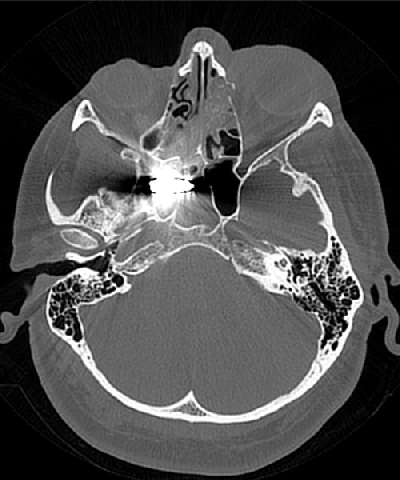
We are currently repairing and restoring our facility and the equipment that has been preserved, as far as our financial capabilities allow. To date, and this is more than a year now, our team has been working on the basis of another medical institution in Kyiv, but they did not have their own CT scanner on staff. And it so happened that our small team of the CT department was lucky enough to work and, in the first months, live in the private medical center LifeSсan. And I want to express my gratitude to Chukanov Oleksandr and Kyrychenko Vitaliy who allowed us to work together for a common goal, and also gave us the opportunity to serve our military servicemen for free.
In the summer of 2022, I had to work at a hospital in Dnipro, which is close to the front line, and their CT scanner was the same as ours, a 16-slice Canon. The employees of the CT room were civilians and they were not required to work overtime, but what I saw surprised me. From the first day of the war, they just lived at work, sleeping wherever there was a free place, if there was such a possibility at all.
Until the process of evacuation, both from them and to them, was settled, the wounded, the so-called 300, were being transported constantly day and night. These were critical injuries to the whole body, polytrauma, multiple foreign bodies in the neck near the vessels, and closed head injuries, hemopneumothorax, fractures of the ribs, shoulder blades, multiple fragmentation fractures of the pelvis, and avulsion fractures of the limbs, with long defects that often required amputation. Massive deformed soft tissue defects with multiple metal fragments from cluster munitions. Penetrating gunshot blind wounds of the abdominal cavity, liver and spleen ruptures with complicated internal bleeding, ureteral ruptures, post-traumatic aneurysms, damage to the pelvic organs and much more. Our military surgeons, anesthesiologists and everyone involved tried to save everyone at all stages of the evacuation, almost all of them already had experience in combat conditions since 2014.
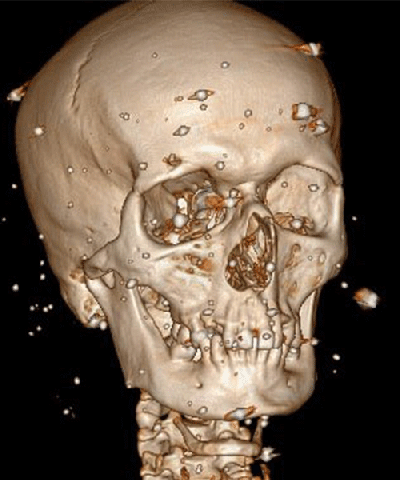
In conclusion, I believe in our victory, that we will defeat our enemy. We are strong, we are a nation. We will definitely recover, revive and overcome all obstacles. We have truth and strength on our side. But there is one thing—we are paying a very high price for this.
Considering the specifics of our facilities and the growing number of patients who will be undergoing long-term rehabilitation, we will strive to improve the quality of care, expand our staff and improve our material base, with the aim of a comprehensive approach to each of our defenders. Also in the future, we would like our military doctors to have the opportunity to train abroad, whenever possible, to gain more experience and tell the world about our own military medical experience in the biggest European war after 1945.